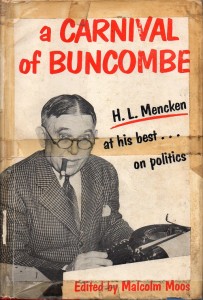Book Review: A Carnival of Buncombe by H.L. Mencken
The 2016 presidential election campaign has already begun, so let’s take a look at a book about elections of the past, shall we? H.L. Mencken (1880-1948) was a newspaperman, most famously on the Baltimore, Maryland Sun. For a number of years, he had a weekly opinion column published on Mondays. These 69 essays are focused primarily on presidential politics between 1920 and 1936.
That covers Warren G. Harding, Calvin Coolidge, Herbert Hoover and the first two elections of Franklin Delano Roosevelt. Mr. Mencken skewers them all, as well as other politicians and public figures of the time. He was famous for his barbs, and is eminently quotable. For example “…going into politics is as fatal to a gentleman as going into a bordello is fatal to a virgin.”
It’s interesting to see what has changed about politics since the first half of the Twentieth Century, and what has remained the same. It’s still amusing to watch a party’s primary candidates tear each other to shreds, then have to work together as best buddies once the party has an official nominee. On the other hand, the Republican and Democratic parties of the time are barely recognizable as the organizations they are now. (One can see the beginnings of the policy flips that lost the Dems the KKK vote.)
Mr. Mencken has a wide vocabulary and many useful words that may come in handy for your own writing. But be warned that he also uses some ethnic slurs that were common at the time. His views are progressive on some subjects, but highly reactionary on others, and he’s not afraid to speak his mind. Mr. Mencken is particularly hard on Methodists and Baptists, who he feels bullied the country into Prohibition (which Mencken was against.)
H.L. Mencken did support some politicians on an individual basis, but was quick to edit his own memory of their performance when they disappointed him. One also has to remember that he had a reputation as a curmudgeon to uphold.
To cover the major players, Warren G. Harding was a compromise candidate chosen for not having particularly strong views on anything; Calvin Coolidge was even less impressive (unless one takes the Jeffersonian dictum that “the government is best that governs least” in which case he is one of the greatest presidents.) Herbert Hoover was sold to America as exactly the kind of person who could fix a financial crisis should one pop up–he wasn’t. And FDR would have been better suited to the job of king.
Interesting historical perspective: Mr. Mencken writes several times about the perception that Hoover was too close to the British, something that didn’t get any play in the little I heard about him in school.
This collection was put together in the 1950s with the aid of political history scholar Malcolm Moos; it already needed an extensive “glossary” of names mentioned in the columns to remind people of who they’d been. Even with the glossary and index, some knowledge of early 20th Century American politics is vital to the reader getting anything but a few chuckles out of the text. My copy is in bad shape, as you can see, but the book has been reprinted a few times, so check your library or used book store.
Recommended to students of American politics in the first half of the 20th Century.

